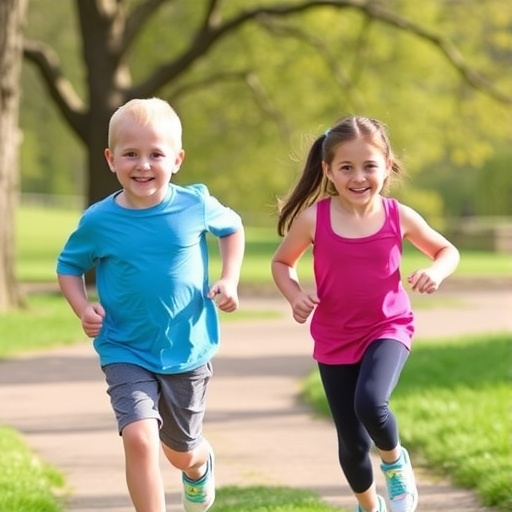In a groundbreaking study published in BMC Pediatrics, Rodríguez-Rodríguez et al. delve into the vital role of parental involvement in fostering physical activity among children. The research highlights a clear correlation between the active behaviors of parents and the out-of-school physical activity of their offspring. The findings hold significant implications, especially in an age where sedentary lifestyles have become a concerning norm. Understanding how parental actions can directly influence children’s activity levels could reshape not only parenting styles but also public health initiatives aimed at combatting childhood inactivity and obesity.
Childhood obesity is a growing epidemic, with alarming rates reported globally. The World Health Organization has recognized the importance of physical activity in maintaining a healthy weight. However, many children fall short of the recommended activity levels due to various factors, including increased screen time, a lack of structured physical activities, and, most critically, the influence of parental behavior. This study provides a nuanced perspective, offering compelling evidence that parents who engage in physical activities themselves are more likely to inspire similar habits in their children.
The research methodology employed in this study was robust. Through a comprehensive survey targeting families, the authors analyzed data from diverse demographics, ensuring a representative sample. Participants reported not only their children’s physical activity levels but also their own habits concerning exercise and outdoor play. This dual-reporting mechanism allowed the researchers to draw precise correlations between parental activity and that of their children, forming the backbone of their findings.
Interestingly, the study suggests that it is not merely the encouragement of parents that leads to increased physical activity but the demonstration of active lifestyles. Children who witness their parents participating in sports, playing outside, or engaging in physical activities are significantly more likely to emulate these behaviors. This observational learning is crucial in child development, as it goes beyond mere words of encouragement and incorporates the modeling of healthy habits.
The implications of these findings resonate in multiple spheres, including educational policies and community programs. Schools could play a pivotal role by integrating family involvement in physical activities within their curriculums. Engaging parents in school sports days or after-school active programs could foster a culture of collective physical engagement. By creating environments where families can participate together, educational institutions could potentially amplify the outcomes of such studies, translating research insights into practical community health initiatives.
Moreover, the public health sector can leverage this research by crafting campaigns aimed at improving parental involvement in children’s physical activities. This could include educational resources that guide parents in developing and maintaining an active lifestyle while emphasizing its potential benefits for their children. By framing physical activity as a family affair, public health messages could more effectively promote healthy behaviors among both parents and children alike.
Beyond immediate physical activity, this research raises fundamental questions regarding the long-term impact of parental involvement on children’s overall well-being. Establishing a foundation of active behavior could lead to lifelong habits, influencing not just physical fitness but also mental health. Regular physical activity is linked to reduced stress, enhanced mood, and improved cognitive function, suggesting that children raised in active environments may experience holistic benefits throughout their lives.
As the landscape of parenting evolves, so does the understanding of its role in child development. Raising active children requires more than just awareness of health guidelines—it necessitates an active commitment from parents themselves. This study underscores the importance of self-awareness among parents regarding their physical habits and how these can inadvertently set the tone for their children’s lifestyles.
However, it is essential to recognize that the dynamics of family life are multifaceted. Factors such as socioeconomic status, access to recreational spaces, and cultural beliefs also play significant roles in shaping children’s activity levels. Future research should aim to investigate these variables further, as well as develop targeted interventions that address specific community needs.
Through its rigorous approach, this study contributes essential insights to the discourse on child health, underscoring the complexities of parenting and its influence on children’s lifestyles. The relationship between parental behavior and children’s physical activity is significant, and fostering a culture of health-consciousness within families could serve as a pivotal strategy in combating childhood obesity.
As we move towards more active generations, this research serves as a timely reminder of the responsibilities parents bear in shaping their children’s health trajectories. The compelling evidence presented by Rodríguez-Rodríguez et al. not only highlights the importance of parental involvement but also emphasizes that active family dynamics can significantly alter the landscape of children’s health and well-being.
In conclusion, the findings of this research are a clarion call to parents, educators, and policymakers alike. A collaborative approach to fostering physical activity among families can yield substantial benefits for public health. By actively engaging in physical pursuits as a family, parents can not only enhance their children’s health but also contribute to a more vibrant, active society. It is time to reimagine the role of parenting in physical activity and embrace the profound impact it can have on the next generation.
In the wake of these enlightening findings, strategies that promote parental participation in physical activities can no longer remain an afterthought. They must become central to how we view family health and wellness. As we reshape our definitions of active lifestyles, let us recognize that the path to achieving healthier children begins with equally engaged parents.
Subject of Research: Parental Influence on Children’s Physical Activity
Article Title: Active Behaviour of Parents is More Associated with Out-of-School Physical Activity in Their Children
Article References:
Rodríguez-Rodríguez, F., Hernández-Jaña, S., Castro-Piñero, J. et al. “Active behaviour of parents is more associated with out-of-school physical activity in their children”.
BMC Pediatr 25, 650 (2025). https://doi.org/10.1186/s12887-025-06014-8
Image Credits: AI Generated
DOI: 10.1186/s12887-025-06014-8
Keywords: Parental involvement, children’s physical activity, childhood obesity, health behaviors, active lifestyle.




